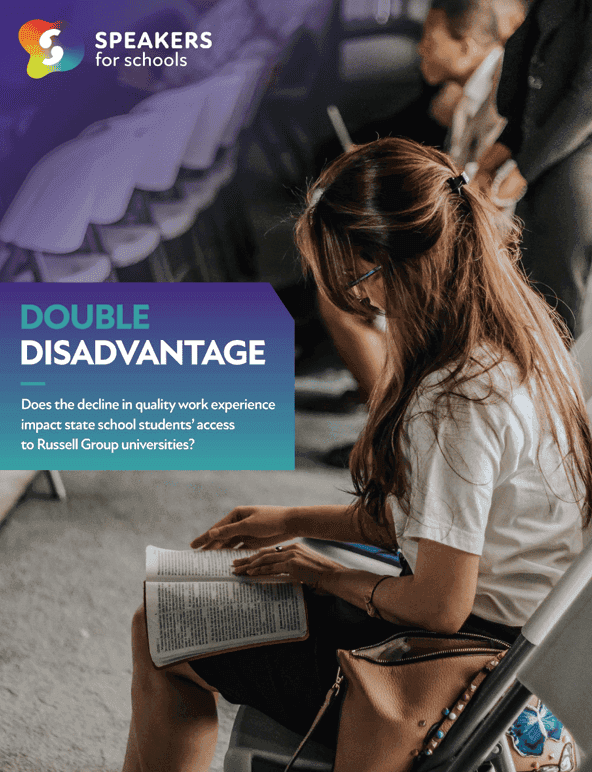Double Disadvantage: How Lack of Work Experience Limits State School Students’ Access to Top UK Universities
The attainment gap between young people attending state schools and private schools – which already inhibits fair access to the country’s top universities for even the most talented state sector students – is further compounded by the double disadvantage of lack of access to work experience and extracurricular activities.
While young people attending private schools enjoy a wide range of opportunities to gain insights into the worlds of work and further education, enhancing their understanding and confidence as well as their CVs, the vast majority of young people are held back in their applications even if they achieve the required grades by a huge disparity in access to meaningful work experience.
Speakers for Schools’ research found that a shocking 50% of students in the state sector leave school without any work experience – yet this is used a third of the time to assess applications at universities.

The United Kingdom is fortunate to be home to some of the highest-ranking universities in the world. Admission to these prestigious institutions can carry multiple benefits for a young person and can help smooth the path to some highly regarded and lucrative careers. It is of little surprise, therefore, that fair access to top universities has become a focus of attention for those seeking to improve social mobility. But the odds of success remain heavily stacked in favour of young people from more privileged backgrounds.
The attainment gap undeniably creates a major obstacle for disadvantaged young people to reach Russell Group universities. However, our report shows that success is dependent upon much more than just getting the grades. Unequal access to insights, information and support plays a crucial role in determining whether a talented young person will apply to a top university, and then succeed in their application. This includes aspects such as information to inform GCSE and A-level selection; access to opportunities for relevant work experience and enrichment activities; sufficient familiarity with the choices available; and knowledge and support in preparation for application and interview.
Research by Zero Gravity also found that 24% of state school students need more self-belief to apply to a Russell Group university despite meeting the grade requirements – the type of self-belief that a broader range of experiences beyond the classroom can help to develop.
Participation in work experience, enrichment, and extracurricular activities can showcase passion, commitment, and interest to the admission officers. Unfortunately, lack of awareness and reduced access to enrichment activity and work experience present hidden barriers for young people with more limited social and cultural capital.
With intense competition for places, it is vital that talented young people can compete on a level playing field in securing access to our top universities. However, evidence highlighted in this report shows:
- The proportion of offers from Russell Group Universities dropped from 60% in 2021 to 55% in 2022, making competition more fierce[1]
- Applicants from affluent areas of the UK are nearly six times more likely to have a prestigious university offer, such as from a Russell Group institution, than those living in a disadvantaged area[2]
- On at least a third of occasions, evidence of work experience and enrichment activities is used to assess university applications[3]
- Half of state-school students leave secondary school without having had access to work experience[4]
- 30% of young people attending state schools stated they would have welcomed more help from their school or college on how to get into university, compared with just 13% attending independent schools[5]
The report makes several recommendations, including a call for universally funded work experience for state-school students in England, which Speakers for Schools has been campaigning for since 2022. The charity estimates it would cost the government up to £75million a year to fund, only 0.1% of the annual schools’ budget.
In the meantime, Speakers for Schools calls on Russell Group universities to be consistent and transparent about the value of work experience and enrichment activities in applications; it should be clearly outlined if it positively impacts admission. The charity urges Russell Group universities to reach out to more schools in disadvantaged regions to inspire talented students.
[1] https://amp.theguardian.com/education/2022/jun/15/offer-rate-for-a-level-students-applying-to-top-universities-falls-to-55
[2] https://www.suttontrust.com/wp-content/uploads/2019/12/JONESPERSONALSTATEMENTS-2.pdf
[3] Speakers for Schools. (2023) Research involved a review of web-based materials setting out HEI admissions criteria for each subject.
[4] https://www.speakersforschools.org/wp-content/uploads/2022/11/SP-2074_SFS-Work-Experience-For-All-YouGov-Report_v1.pdf
[5]https://assets.publishing.service.gov.uk/government/uploads/system/uploads/attachment_data/file/811045/Elitist_Britain_2019.pdf